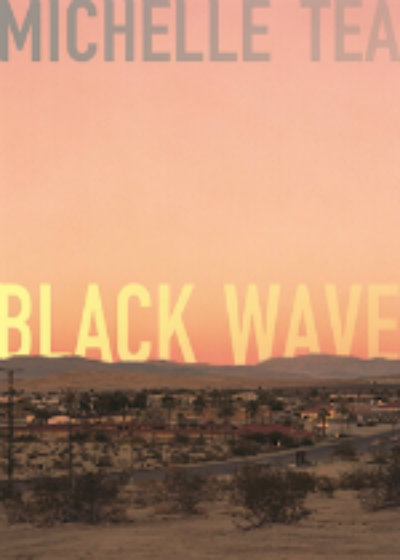‘Black Wave’ by Michelle Tea

Author: Sara Rauch
August 28, 2016
What if the world had ended in 1999? How would the story of your life have changed?
In Michelle Tea’s newest book, Black Wave, this is the case: as 1999 progresses, the state of the declining world moves rapidly toward decimation. The narrator, Michelle—a hard-partying, drink and drug-loving, San Franciscan lesbian writer—decides it’s time to get out of dodge, and announces her plan to move to Los Angeles. Her friends don’t believe her, but Michelle lives up to her promise—after a few more binges and a few more kisses— convincing a lover to rent a U-haul and drive her south.
Once Michelle arrives in LA, a couple things happen. The stitching of this piece of fiction unravels, revealing a meta-glimpse into Michelle’s awareness as both writer and narrator. The story you’ve relaxed into becomes, well, not real. As a reader, you wonder, does it matter? Is that not the pact you agree to each time you pick up a novel? But it does matter in Black Wave because this is a story about consciously choosing to tell a story instead of the truth. The other thing that happens, equally integral to this convincing dystopia, is that global warming peaks. From the squalid solitude of her new apartment, Michelle watches the televised beginning of the end. Suicides abound. Everyone knows they don’t have much time, but no one knows how much. The uncertainty gets to most, but not to Michelle, whose survivalist instinct kicks in. Michelle quits drinking, takes over the ownership of the used bookstore where she worked, finally has dinner with her brother. The “dreams” that become a new sort of addiction for the remaining population do not convince Michelle to abandon her reality—instead, she learns to enjoy her new life, however little there is left of it.
You might recognize this Michelle, if you’ve read Valencia, but then again, you might not. That’s one of the unsettling beauties of Black Wave—the meta-narrative weaves fiction with nonfiction, living by its own set of rules. Here what is true and what is created blend, blurring the lines into something bigger. Is this a story about a broken heart? Is it a story about the end of the world? Is it a story about recovery? Is it a coming-of-age story? Yes, yes, yes, and yes. And it’s more too—Black Wave is about queer subculture and the importance of storytelling, and it’s an existential meditation on the consequences of choice.
If you know Michelle Tea’s writing, you know that her work is energetic, gritty, self-aware, and totally unflinching—in these regards, Black Wave does not disappoint. If you are new to Tea’s writing, Black Wave is as good a place to start as any—in many respects, the book is a necessary companion to Tea’s earlier memoirs—diving right in to the heady waters of being a queer feminist writer.
Michelle says of the girls she meets while teaching workshops: “She wanted to free them all, all the girl writers. Girls needed to tell the truth about what the fuck was going on in this world. It was bad.” Only a book like Black Wave could get away with such a profound meta moment—and there is a sense of reverent freedom in these pages. Stripped of the tyranny of having to tell the truth, Black Wave is a dreamy apocalypse novel, and a fine exploration of how fiction and nonfiction live side by side.
Black Wave
By Michelle Tea
Feminist Press
Paperback, 9781558619395, 336 pp.
September 2016

